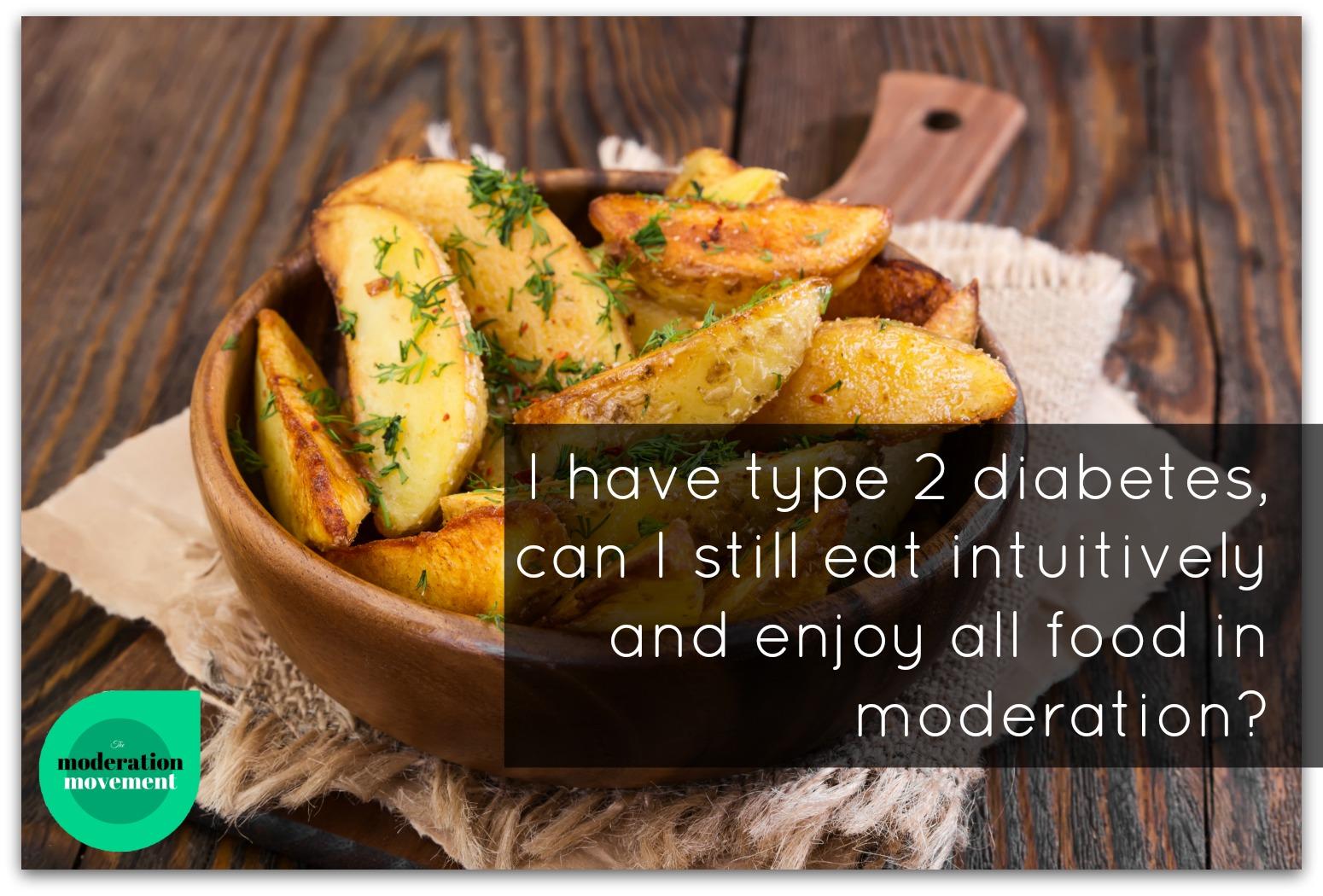I have type 2 diabetes, can I still eat intuitively and enjoy all food in moderation?

Part of managing type 2 diabetes is keeping your blood sugar within a stable range. What you eat and how much you move can certainly influence this.
Eat carb rich food and your blood sugar might spike, eat too little food and your blood sugar might drop too low, especially if you’re on medication. Because of this you might be thinking you need to avoid certain foods or stick to specific guidelines. While external guidelines can certainly be useful, your body can also be a guide too.
The question to explore is, how does your body feel when these fluctuations in blood sugar occur? The intuitive eating process helps you explore this. It is important to note that many people are disconnected from sensations in the body, such as their hunger and fullness cues and how food makes them feel. If this is you, it may take time before you are able to pick up on various subtle clues that let you recognise your blood sugar disturbances, and you may require help from a skilled practitioner.
Let’s say one of your favourite things to eat is hot chips or pasta, everything you’ve ever read or ever been told probably says to limit or avoid this type of food. But will enjoying this food really be bad for your health? If the food causes a blood sugar spike, you might experience slowed mental performance, reduced concentration and energy levels, and even changes in mood. Most of us don’t want to feel like this after a meal, at least not a on a regular basis. Therefore, if you’re attuned enough to your body to recognise these effects, you might choose to eat food that doesn’t spike your blood sugar in this way. Through exploring how food leaves you feeling, you might find that a smaller serve of the food enjoyed with a salad or side of veggies, or some protein helps you avoid the sugar spike and to feel more energised after a meal.
If you’re an emotional eater, experience disordered eating, or are prone to over-eating at times, these behaviours, or coping mechanisms, don’t just go away with a diagnosis of diabetes. They may settle with initial motivation to manage your new condition, but for most people they will reappear at some point. Therefore, establishing and nurturing a healthy relationship with food is just as important as managing your blood sugar. In fact it is part of managing your blood sugar.
If you choose to explore the intuitive eating path, you may initially find your self eating more of the foods you’ve been told to reduce as you work through the process of healing your relationship to food. But as you heal this relationship, you will start to find these foods have a less of a hold over you and at some point you’ll find yourself eating less of them and not in amounts that interfere with managing your blood sugar, at least not on a regular basis. If you continue to battle with food and swing from restriction to over-eating, this will adversely affect managing your diabetes.
Stress also impacts on blood sugar control. If trying to eat or be active in a certain way to manage blood sugar, impacts your stress levels, then this may be more a hindrance than a help in the big picture of health.
Perhaps your doctor, endocrinologist, diabetes educator or dietitian has suggested you lose weight to help manage your diabetes. We must remember that weight is not a behaviour, you can’t just go and lose weight. Let’s assume your body is happy to let go of some of your fat stores, are there changes you could make to your diet or activity levels? If so, the Health At Every Size® and intuitive eating approach are a great way to address these. You might like to seek help from a HAES® aligned, Non-Diet/Intuitive Eating Approach professional, but please make sure they are weight neutral.
So can you eat intuitively and enjoy all food in moderation and manage your diabetes? I believe the answer is yes. Moderation and intuitive eating go hand in hand. Moderation is sometimes saying yes and sometimes saying no, it’s sometimes eating a little of something and sometimes enjoying more. Finding what moderation means for you will come from being attuned to your body, your internal cues of hunger and fullness and how food leaves you feeling.
